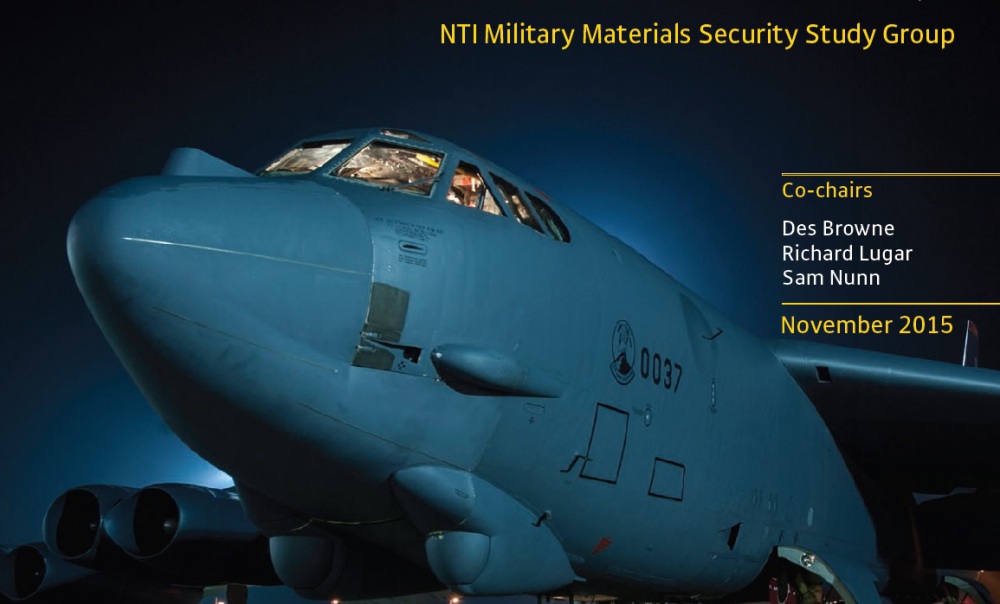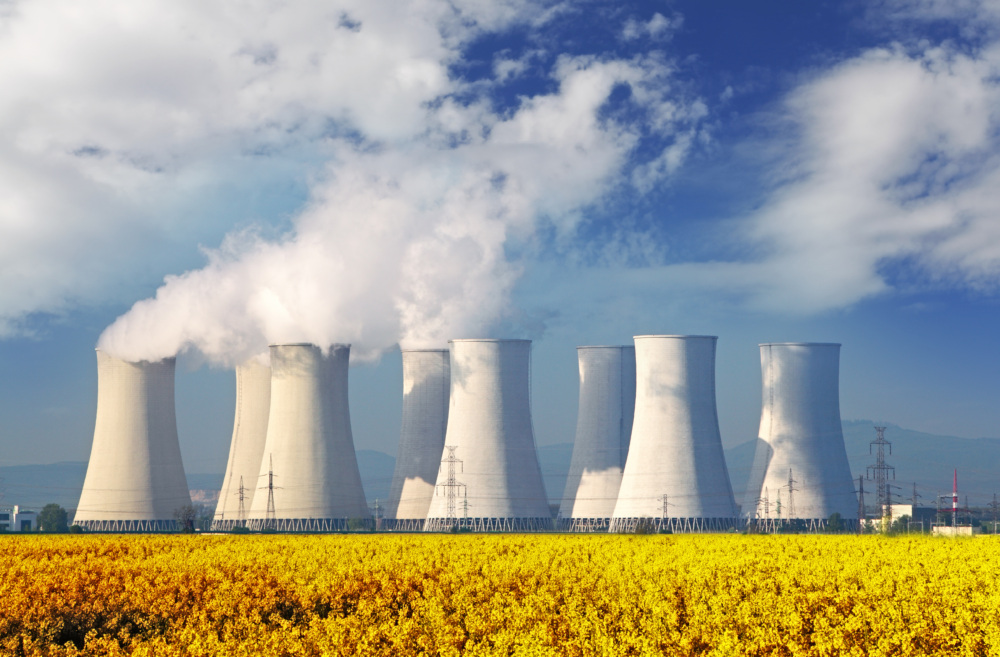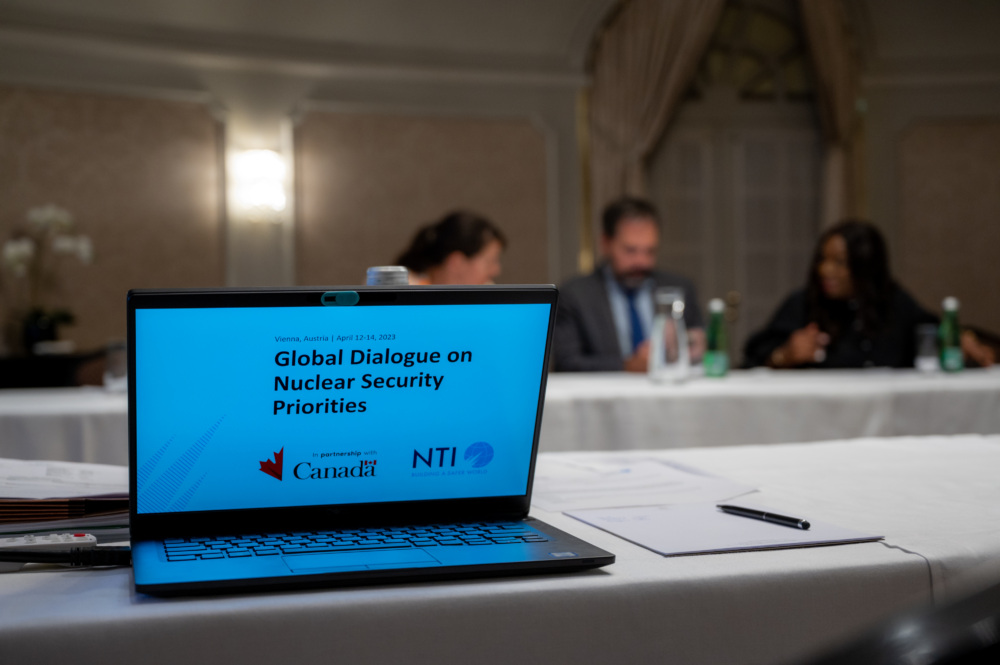Bridging the Military Nuclear Materials Gap highlights a critical gap in global nuclear security efforts and offers recommendations for governments to tighten control and build confidence in the security of nuclear materials categorized as “military.”
The Nuclear Threat Initiative sponsored the Military Materials Security Study Group, which comprised of prominent leaders in the military, political and technical sectors from China, France, Pakistan, Russia, the United Kingdom and the United States. The group worked to address the security of the 83% of global stocks of weapons-usable plutonium and highly enriched uranium (HEU) that are not subject to current international security standards, mechanisms, or confidence-building arrangements.
The group was co-chaired by Sam Nunn, NTI Co-chairman and former U.S. Senator; former Senator Richard Lugar;; and Des Browne, NTI Vice Chairman and former U.K. Defence Secretary. The report includes recommendations for governments in advance of the fourth and final Nuclear Security Summit, set to take place in Washington, D.C., in March 2016.
From the Foreword, by Des Browne, Richard Lugar, and Sam Nunn, co-chairs of the NTI Military Materials Security Study Group:
One of the greatest threats the world faces is the possibility that a terrorist group could acquire and detonate a nuclear weapon or device. A terrorist nuclear attack in any large city would likely kill hundreds of thousands of people, inflict billions of dollars in damage, and have profound effects on global security, the global economy, and our way of life. The effects of such an attack would no doubt transcend national boundaries, thus compelling a global response to a global threat.
Today, more than 1,800 metric tons of weapons-usable nuclear materials—highly enriched uranium and plutonium—remain stored in hundreds of facilities, some poorly secured and vulnerable to theft, across 24 countries. Recent security breaches and incidents at nuclear facilities illustrate that governments must do more to secure these dangerous materials and keep them out of the hands of terrorists.
In recent years, leaders have placed increased attention on nuclear materials security through a series of Nuclear Security Summits. However, despite important efforts to better secure materials in a number of countries, there is still no effective global system for how all weapons-usable nuclear materials should be secured. Implementation of existing international guidelines remains far from universal, and no mechanism exists for holding countries accountable for lax security at nuclear facilities.
Moreover, even those mechanisms that do exist apply almost exclusively to a small fraction of all weapons-usable nuclear materials—the 17 percent used for peaceful, civilian applications. The remaining 83 percent are commonly categorized as “military materials” and are therefore outside the scope of current international security standards, mechanisms, and confidence-building arrangements.
This military materials gap is dangerous. It creates a significant security risk on its own—and it erects a major barrier to establishing an effective global nuclear security system. Terrorists bent on stealing nuclear materials will not distinguish between nuclear materials designated as civilian and those designated as military. They will seek to obtain materials from the most vulnerable and least protected location. That is why international standards for effective nuclear security should not stop at civilian materials but must apply to any and all nuclear materials that a terrorist could use to build a nuclear device.
To address this risk, the Nuclear Threat Initiative (NTI) convened a high-level Military Materials Security Study Group to examine the issue of military materials security. The Study Group comprised experienced former military and national security officials from China, France, Pakistan, Russia, the United Kingdom, and the United States.
Informed by the deliberations of the Study Group, this report outlines steps that governments should take to reduce the risk of nuclear terrorism by:
-
Strengthening the security of military materials
-
Building confidence in the security of these materials while protecting sensitive information
-
Strengthening the global nuclear security system to cover all nuclear materials, including military materials, by addressing military materials at the 2016 Nuclear Security Summit and beyond.
At the 2014 Nuclear Security Summit in The Hague, leaders from more than 50 countries said in their final communiqué, “We reaffirm the fundamental responsibility of States, in accordance with their respective obligations, to maintain at all times effective security of all nuclear and other radioactive materials, including nuclear materials used in nuclear weapons, and nuclear facilities under their control. This responsibility includes taking appropriate measures to prevent non-state actors from obtaining such materials—or related sensitive information or technology—which could be used for malicious purposes, and to prevent acts of terrorism and sabotage.”
The 2016 Nuclear Security Summit offers an important opportunity for governments to deliver on these commitments and to take steps toward establishing a truly comprehensive global nuclear security system.
We would like to thank NTI’s generous funders, including the John D. and Catherine T. MacArthur Foundation and the Peter G. Peterson Foundation, for their support of this important project.




